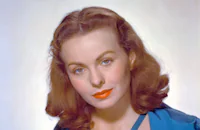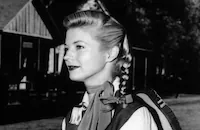Take Care of My Little Girl

Brief Synopsis
Cast & Crew
Jean Negulesco
Jeanne Crain
Dale Robertson
Mitzi Gaynor
Jean Peters
Jeffrey Hunter
Film Details
Technical Specs

Synopsis
College freshman Elizabeth Ericson is thrilled to arrive with her best friend, Janet Shaw, at Midwestern University, her parents' alma mater. Liz and Janet hope to be accepted to the Tri-U Sorority, to which Liz's mother belonged. In fact, Liz feels that sorority membership is almost more important than her education, and is surprised when her and Janet's new roommate, Adelaide Swanson, expresses no interest in joining. During "Rush Week," Liz and her friends attend the social functions at all of the sororities, although Liz still has her hopes pinned on Tri-U, which is the most exclusive sorority. In addition to Tri-U sisters Marge Colby, Merry Coombs, Dallas Pruitt and Casey Krause, Liz meets Joe Blake, an older student going to school on the G.I. Bill. Liz likes the handsome senior, but refuses to listen to his condemnation of sororities as snobbish cliques. After Rush Week, the Tri-U sisters vote on the new pledges, and Liz is accepted, although Janet is not. Arrogant Dallas insists that Ruth Gates, a painfully shy girl whose mother was a Tri-U, be blackballed, but Casey pleads her case and Ruth is admitted. Despite Liz and Janet's girlhood pledge never to be separated, Liz reluctantly moves into the Tri-U house, while Janet, crushed at her rejection, leaves college and returns home. Liz is guilt-stricken over Janet's departure, but Joe assures her that time to mature may be just what Janet needs. As the weeks pass, Dallas attempts to "improve" the awkward Ruth, while Liz takes a liking to Chad Carnes, the most popular fraternity boy on campus, despite his reputation as a drunken womanizer. Hoping to impress the girls at the upcoming Christmas dance, Ruth goes into debt to buy an expensive gown. When midterm exams approach, Liz is frustrated by the noise at the Tri-U house and goes to the quiet dormitory to study with Adelaide. Liz is surprised to receive a call from Chad, who, in a panic, left his French exam without answering the questions. Chad begs Liz to complete the test for him, as he still has the questions, and he will then exchange her completed blue book for his blank one. Uneasy about cheating, Liz nonetheless helps Chad, who succeeds in switching the blue books and passes the exam. The sorority and fraternity members acclaim Liz as a hero, but Joe is disappointed by her lack of ethics and the two quarrel. Liz then gladly accepts Chad's pin, and that night, Chad and the other Lambda fraternity boys serenade her. Soon after, "Hell Week" begins, and the Tri-U sisters give the pledges humiliating and exhausting tasks to perform. One night, as the sisters concoct the next day's tasks, Dallas states that it is useless to assign anything to Ruth, as she will never vote to accept the still shy girl as a permanent member. The other girls agree that Ruth should be released immediately, and when Merry breaks the news to Ruth, she is crushed. Meanwhile, Liz is ordered to go to a neighboring town on a silly errand, but when Joe sees her at the bus stop, he invites her to a party. Weary of the nonsensical pranks, Liz goes and has a marvelous time with her non-sorority friends, whom she has not seen in weeks. A drunken Chad arrives, and when he chastises Liz for ignoring her duties, he and Joe get into a fistfight. Chad is ejected from the party, and Liz, who realizes that Joe is the better man, removes Chad's pin. When Liz returns to the Tri-U house, she learns that Ruth is missing. Disgusted to learn that Ruth has been "de-pledged," Liz runs through town looking for her, finally finding her in a feverish state attempting to complete her task. Ruth is rushed to the hospital, where she is diagnosed with pneumonia. Ashamed of her Tri-U sisters, Liz returns her sorority pin, which prompts Dallas and house mother Clark to suggest that Ruth be re-pledged in a special ceremony. Liz castigates them for their hypocrisy and snobbishness, then leaves with Joe. Outside, Liz wonders how her mother will react to the news, and Joe gently tells her that even mothers need to grow up, too.

Director

Jean Negulesco
Cast

Jeanne Crain

Dale Robertson

Mitzi Gaynor

Jean Peters

Jeffrey Hunter

Betty Lynn

Helen Westcott
Lenka Peterson
Carol Brannon
Natalie Schafer
Beverly Dennis

Kathleen Hughes
Peggy O'connor
Marjorie Crosland

John Litel
Charlene Hardey
Janet Stewart

Gail Davis
Judy Walsh
Irene Martin
Penny Mcguiggan
Pattee Chapman
Mary Thomas
Palma Shard
Jean Romaine
Margia Dean
William A. Mahan
June Alden
Billy Lechner

George Nader
Grandon Rhodes
Harry Harvey
Virginia Hunt
Eleanor Lawson
Shirley Tegge
Charles Conrad

Margaret Field

King Donovan
Pat Goldin
Katherine Warren
Crew
Julian Blaustein
Monroe W. Burbank
Claude Carpenter
Ken Darby
Ken Darby
Julius J. Epstein
Philip G. Epstein
Peggy Goodin
Harry Jackson
Charles Lemaire
Harry M. Leonard
George Leverett
Thomas Little
Art Lueker
Alfred Newman
Ben Nye
Edward Powell
William Reynolds
Fred Sersen
Travilla
Lyle Wheeler
Joseph C. Wright

Film Details
Technical Specs

Articles
Take Care of My Little Girl
Peggy Goodin's 1950 novel started life as a master's thesis on the sorority system. After she received the degree, she turned it into a novel that sold well as an exposé of racial and religious prejudice within fraternal organizations. When 20th Century-Fox bought the screen rights, screenwriting twins Julius J. and Philip G. Epstein dropped most of the social commentary to focus on the story's possibility as a showcase for their younger contract players. Variety's review mentioned scenes about the snubbing of a Jewish student, but they did not make it into the general release print. The film still packed a punch. In fact, studio head Darryl F. Zanuck had to tell them to give Crain's character more convincing arguments in favor of the sorority system because, as originally written, she seemed so shallow he felt no audience would sympathize with her.
Susan Hayward was originally set for the leading role, with Anatole Litvak directing. At the time, however, Crain was a bigger box-office star, particularly after the success of Pinky (1949), in which she won an Oscar® nomination for playing a light-skinned black woman, and Cheaper by the Dozen (1950), in which she played Clifton Webb and Myrna Loy's daughter. She also was considered more adept at light fare than the more dramatic Hayward, who would beat out Crain for the role of singer Jane Froman in 1952's With a Song in My Heart. Litvak, too, was considered more of a dramatic director, particularly after the success of The Snake Pit (1948). He wound up making the post-World War II drama Decision Before Dawn (1951), with directing chores for Take Care of My Little Girl going to Jean Negulesco.
With its college-set story, Take Care of My Little Girl provided the perfect showcase for the studio's roster of young contract players. The role of the senior who helps set Crain straight about college life would provide Oklahoma-born Dale Robertson with his first leading role. He would provide reliable romantic support for most of Fox's contract stars through his time there. Crain's high-spirited roommate, who has no use for fraternity life, was played by Mitzi Gaynor in only her second feature. It would also be her last supporting role. She was promoted to stardom to play 19th-century stage star Lotta Crabtree in her next film, Golden Girl (1951). Jean Peters, who had debuted at the studio opposite Tyrone Power in Captain from Castile (1947), took on the role of the most snobbish sorority sister. And Jeffrey Hunter, still in his first year at the studio, was cast as the big man on campus who dates Crain before she realizes he's a louse.
Zanuck was so happy with the film, he authorized a budget increase so Negulesco could shoot additional scenes in December 1950, a month after principal photography had been completed. But one group wasn't pleased with Take Care of My Little Girl. When news of the anti-sorority production spread, Fox began receiving letters from the Pan-Hellenic Society pressuring them to drop the film and later to withhold it from release. Even with suggestions of anti-Semitism cut, the depiction of snobbery and cheating offended the organization of fraternities and sororities. Only when the studio's PR department starting using the campaign to generate positive publicity did the pressure stop.
The film opened to mostly positive reviews, though Newsweek's critic complained that some of the novel's most stinging social criticism had been cut. Bosley Crowther's New York Times review was mostly positive. Although he admitted that the romantic plot was pretty much by the book, he found the picture overall "brightly entertaining and frankly provocative." He also praised Crain for her "considerable expressiveness and charm." With her continuing popularity at the box office, the film did solid business and continues to delight her fans.
Producer: Julian Blaustein
Director: Jean Negulesco
Screenplay: Julius J. & Philip G. Epstein
Based on the novel by Peggy Goodin
Cinematography: Harry Jackson
Music: Alfred Newman
Cast: Jeanne Crain (Liz Erickson), Dale Robertson (Joe Blake), Mitzi Gaynor (Adelaide Swanson), Jean Peters (Dallas Prewitt), Jeffrey Hunter (Chad Carnes), Betty Lynn (Marge Colby), Helen Westcott (Merry Coombs), Lenka Peterson (Ruth Gates), Natalie Schafer (Mother Cookie Clark), Gail Davis (Thelma), King Donovan (Cab Driver), John Litel (John Erickson), George Nader (Jack Gruber), Clinton Sundberg (Fraternity Dance Guest).
C-93m.
By Frank Miller

Take Care of My Little Girl
Quotes
Trivia
Notes
According to studio publicity, Peggy Goodin originally wrote Take Care of My Little Girl as her master's thesis for McGill University, then turned it into a novel. For several of the songs listed above, songwriter Ken Darby adapted the music from various traditional melodies. In February 1950, Hollywood Reporter announced that Anatole Litvak would direct and produce the film, with Frank McCarthy serving as the associate producer. Although a November 1950 Hollywood Reporter news item includes Dusty Anderson, the wife of director Jean Negulesco, in the cast, her appearance in the finished film has not been confirmed. Studio publicity includes Garnett Marks and blonde twins Donna Norris and Diana Norris in the cast, but their appearance in the completed picture has also not been confirmed. The Variety review credits Jill Kraft with playing "Sid Goldman," who is referred to as "the snubbed Jewish co-ed" by studio publicity, but she does not appear in the released film. According to a December 26, 1950 Hollywood Reporter news item, studio production chief Darryl F. Zanuck was so enthusiastic about the film that he increased its budget, allowing for additional scenes to be filmed.
In December 1950, Daily Variety reported that the film was already the subject of much controversy, and that pressure was being exerted on the studio by numerous sororities and fraternities not to release it. The Time reviewer noted: "Even before the film was made, het-up sorority sisters blasted it like fruit growers protesting The Grapes of Wrath." The picture received mostly favorable reviews, although some writers stated that it was too one-sided, and the Newsweek critic pointed out that "no hint of the novel's objection to religious or racial prejudice sneaks into the movie." In May 1951, a Hollywood Reporter news item reported that "the Pan-Hellenic Society, furious at Take Care of My Litle Girl, have advised all the Greek letter boy and girl college outfits to stop their protests as 'the film company is getting too much publicity from your objections. Just stay away from the picture when it's shown in your theatre.'" On February 4, 1952, Jeanne Crain and Dale Robertson reprised their roles for a Lux Radio Theatre broadcast of the story.














